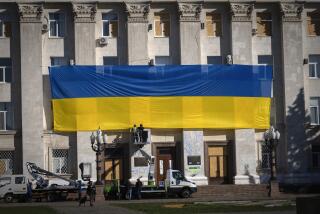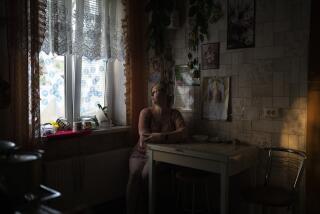His Life in Ruins, Kosovo Trader Puts Faith in Guns
- Share via
LAUSA, Yugoslavia — Haxhi Gecaj was a man of wealth, a trader and village intellectual who taught the Kosovo farmers who respected him the righteous ideals of peaceful resistance.
But Gecaj’s family property--the three-story house with its 24 rooms full of furniture and appliances, the four cars, the four-wheel-drive truck, the 32,000 pounds of wheat and flour--is now gone, all of it destroyed or stolen by Serbian security forces.
The walls of his house are black with soot from the fire that gutted the building after the Serbs’ mortar bombs smashed through the red-tiled roof. Somehow, the satellite TV dish survived.
So did two small corner rooms on the top floor. Gecaj has moved back into them with his wife and their three children, ages 5 months to 7 years, and a grandmother.
“It’s better to live in one room in your own home than as a guest anywhere else,” said Gecaj, who shares a small room with five men, all brothers or comrades, who were sitting on three beds amid a gray haze of cigarette smoke. The women and children live in the adjacent room.
With his house and business in ruins, Gecaj has little left to lose and, in his eyes, much to gain if he keeps fighting for what he believes in. That is why an AK-47 assault rifle hangs above his bed.
It’s in a row of five, one of which is mounted with a scope. A Kalashnikov rifle is propped up on the other side of the room. Camouflage fatigues hang on the far wall.
“In case of attack, we must protect ourselves,” Gecaj said as he sat beside a wood-burning stove and talked about how a rich trader became a guerrilla fighter in a war for independence.
Kosovo is part of Serbia, the dominant republic in what remains of Yugoslavia, and Yugoslav President Slobodan Milosevic has repeatedly said he will never let it break away.
About 90% of Kosovo’s people are ethnic Albanians, who voted for independence in an unofficial 1991 referendum.
The North Atlantic Treaty Organization’s threat this fall to bomb Serbian targets brought a tentative peace to Kosovo, but isolated clashes continue, and NATO commanders warn that diplomats have only a few months at most to avert more war. Yugoslav army troops fought a five-hour battle with ethnic Albanian guerrillas early Monday, killing 31 and wounding 12 near Gorozup and Liken, about 45 miles southwest of the provincial capital, Pristina, the state-run Serbian Media Center reported.
It was the most serious battle since U.S. diplomat Richard Holbrooke brokered the tentative peace deal with Milosevic in mid-October. The ethnic Albanian casualties in the fighting early Monday were dressed in uniforms of the Kosovo Liberation Army, or KLA, and were smuggling weapons into the territory, according to the government’s account, which did not list any casualties on the Serbian side.
The ethnic Albanians’ Kosovo Information Center confirmed the clashes and said heavy explosions were heard from two villages sealed off by Serbian security forces.
Amid escalating tensions, U.S. envoy Christopher Hill is trying to negotiate a peace agreement that would keep Kosovo in Serbia, but both sides have rejected each draft accord he has proposed.
Ethnic Albanian negotiators have suggested that they would accept an interim deal that would delay a decision on Kosovo’s status for three years, but only if Kosovo becomes the third republic in Yugoslavia’s federation. They also insist that Kosovo’s people must be allowed to choose in an official referendum between staying in Yugoslavia and going it alone.
An eight-month Serbian offensive that ended in October destroyed thousands of homes and forced about 250,000 people to flee, but ethnic Albanians have not dropped their demand for independence.
Their leaders, including Ibrahim Rugova, have repeated that position to Hill, despite a clear message from Western governments that they don’t want Kosovo to separate from Serbia. Rugova led years of peaceful resistance to the Serbs but this year has been forced to accept the armed struggle.
Before war broke out in late February, Gecaj thought peaceful protest was the right path to freedom. He was a local leader of the struggle as the head of Rugova’s Democratic Alliance of Kosovo.
Gecaj started to question his ideals after Serbian police killed a teacher in Lausa on Nov. 27, 1997, apparently in retaliation for an attack on police trying to enforce tax collection in a nearby village.
At the teacher’s funeral the next day, members of what was then a small group of fighters calling itself the Kosovo Liberation Army appeared in public for the first time.
One of Gecaj’s brothers had been a student of the teacher as a child, and he had come back from Germany to pay his respects. Before long, the Gecaj clan was a core cell in the KLA.
The seven Gecaj brothers and their families, 35 people in all, lived in four houses in a large walled compound near the town of Srbica, about 20 miles northwest of Pristina.
Gecaj thinks that Serbian paramilitary police were well informed and that they singled out the family compound as a target.
“You know that the main cell of a movement is always the intellectuals, so they knew what they were doing,” he said.
The war spread until large swaths of Kosovo were crumbling and in flames, but few places suffered as much as Lausa. The area is so badly damaged that only a dozen families out of a prewar population of 4,600 have come back.
Fear keeps some people away. Serbian police still patrol the region, Gecaj said. They maintain a post just a few minutes’ walk from Gecaj’s house.
“Every day, we have police moving through the middle of town,” he said.
With two enemy forces so close, the slightest spark could reignite Kosovo’s war. Since Gecaj’s base is also his home, his three children may be living on the front line once more, this time in a virtual ghost town.
More to Read
Sign up for Essential California
The most important California stories and recommendations in your inbox every morning.
You may occasionally receive promotional content from the Los Angeles Times.













